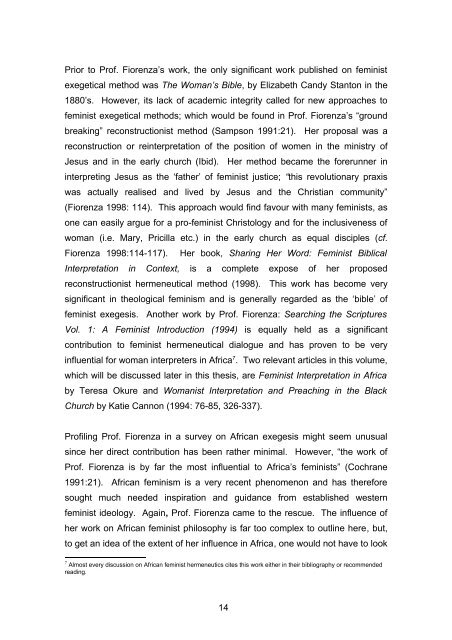African Hermeneutics: The Current State - Theology In Africa
African Hermeneutics: The Current State - Theology In Africa
African Hermeneutics: The Current State - Theology In Africa
Create successful ePaper yourself
Turn your PDF publications into a flip-book with our unique Google optimized e-Paper software.
Prior to Prof. Fiorenza’s work, the only significant work published on feminist<br />
exegetical method was <strong>The</strong> Woman’s Bible, by Elizabeth Candy Stanton in the<br />
1880’s. However, its lack of academic integrity called for new approaches to<br />
feminist exegetical methods; which would be found in Prof. Fiorenza’s “ground<br />
breaking” reconstructionist method (Sampson 1991:21). Her proposal was a<br />
reconstruction or reinterpretation of the position of women in the ministry of<br />
Jesus and in the early church (Ibid). Her method became the forerunner in<br />
interpreting Jesus as the ‘father’ of feminist justice; “this revolutionary praxis<br />
was actually realised and lived by Jesus and the Christian community”<br />
(Fiorenza 1998: 114). This approach would find favour with many feminists, as<br />
one can easily argue for a pro-feminist Christology and for the inclusiveness of<br />
woman (i.e. Mary, Pricilla etc.) in the early church as equal disciples (cf.<br />
Fiorenza 1998:114-117). Her book, Sharing Her Word: Feminist Biblical<br />
<strong>In</strong>terpretation in Context, is a complete expose of her proposed<br />
reconstructionist hermeneutical method (1998). This work has become very<br />
significant in theological feminism and is generally regarded as the ‘bible’ of<br />
feminist exegesis. Another work by Prof. Fiorenza: Searching the Scriptures<br />
Vol. 1: A Feminist <strong>In</strong>troduction (1994) is equally held as a significant<br />
contribution to feminist hermeneutical dialogue and has proven to be very<br />
influential for woman interpreters in <strong>Africa</strong> 7 . Two relevant articles in this volume,<br />
which will be discussed later in this thesis, are Feminist <strong>In</strong>terpretation in <strong>Africa</strong><br />
by Teresa Okure and Womanist <strong>In</strong>terpretation and Preaching in the Black<br />
Church by Katie Cannon (1994: 76-85, 326-337).<br />
Profiling Prof. Fiorenza in a survey on <strong><strong>Africa</strong>n</strong> exegesis might seem unusual<br />
since her direct contribution has been rather minimal. However, “the work of<br />
Prof. Fiorenza is by far the most influential to <strong>Africa</strong>’s feminists” (Cochrane<br />
1991:21). <strong><strong>Africa</strong>n</strong> feminism is a very recent phenomenon and has therefore<br />
sought much needed inspiration and guidance from established western<br />
feminist ideology. Again, Prof. Fiorenza came to the rescue. <strong>The</strong> influence of<br />
her work on <strong><strong>Africa</strong>n</strong> feminist philosophy is far too complex to outline here, but,<br />
to get an idea of the extent of her influence in <strong>Africa</strong>, one would not have to look<br />
7 Almost every discussion on <strong><strong>Africa</strong>n</strong> feminist hermeneutics cites this work either in their bibliography or recommended<br />
reading.<br />
14


